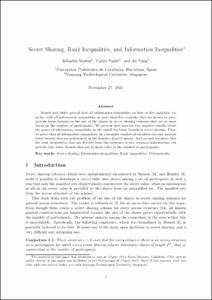Exploració per autor "Martín Mollevi, Sebastià"

Ara es mostren els items 1-6 de 6
-
Examen Final

Aroca Farrerons, José María; Escudero Royo, Miguel; Martín Mollevi, Sebastià; Muñoz López, Francisco Javier (Universitat Politècnica de Catalunya, 2021-01-20)
Aroca Farrerons, José María; Escudero Royo, Miguel; Martín Mollevi, Sebastià; Muñoz López, Francisco Javier (Universitat Politècnica de Catalunya, 2021-01-20)
Examen
Accés restringit a la comunitat UPC -
Examen Final


Escudero López, Manuel; Martín Mollevi, Sebastià; Muñoz López, Francisco Javier (Universitat Politècnica de Catalunya, 2022-01-17)
Escudero López, Manuel; Martín Mollevi, Sebastià; Muñoz López, Francisco Javier (Universitat Politècnica de Catalunya, 2022-01-17)
Examen
Accés restringit a la comunitat UPC -
Frameproof codes, separable codes and B2 codes: bounds and constructions

Fernández Muñoz, Marcel; Livieratos, John; Martín Mollevi, Sebastià (Springer, 2023-11-10)
Fernández Muñoz, Marcel; Livieratos, John; Martín Mollevi, Sebastià (Springer, 2023-11-10)
Article
Accés obertIn this paper, constructions of frameproof codes, separable codes, and B2 codes are obtained. For each family of codes, the Lovász Local Lemmais used to establish lower bounds for the codes. The obtained bounds match all ... -
Improving the linear programming technique in the search for lower bounds in secret sharing

Farràs Ventura, Oriol; Kaced, Tarik; Martín Mollevi, Sebastià; Padró Laimon, Carles (2020-11)
Farràs Ventura, Oriol; Kaced, Tarik; Martín Mollevi, Sebastià; Padró Laimon, Carles (2020-11)
Article
Accés obertWe present a new improvement in the linear programming technique to derive lower bounds on the information ratio of secret sharing schemes. We obtain non-Shannon-type bounds without using information inequalities explicitly. ... -
Linear threshold multisecret sharing schemes

Farras Ventura, Oriol; Gràcia Rivas, Ignacio; Martín Mollevi, Sebastià; Padró Laimon, Carles (Springer Verlag, 2009)
Farras Ventura, Oriol; Gràcia Rivas, Ignacio; Martín Mollevi, Sebastià; Padró Laimon, Carles (Springer Verlag, 2009)
Text en actes de congrés
Accés obertIn a multisecret sharing scheme, several secret values are distributed among a set of n users, and each secret may have a differ- ent associated access structure. We consider here unconditionally secure schemes with ... -
Secret sharing, rank inequalities, and information inequalities

Martín Mollevi, Sebastià; Padró Laimon, Carles; Yang, An (2016-01)
Martín Mollevi, Sebastià; Padró Laimon, Carles; Yang, An (2016-01)
Article
Accés obertBeimel and Orlov proved that all information inequalities on four or five variables, together with all information inequalities on more than five variables that are known to date, provide lower bounds on the size of the ...





